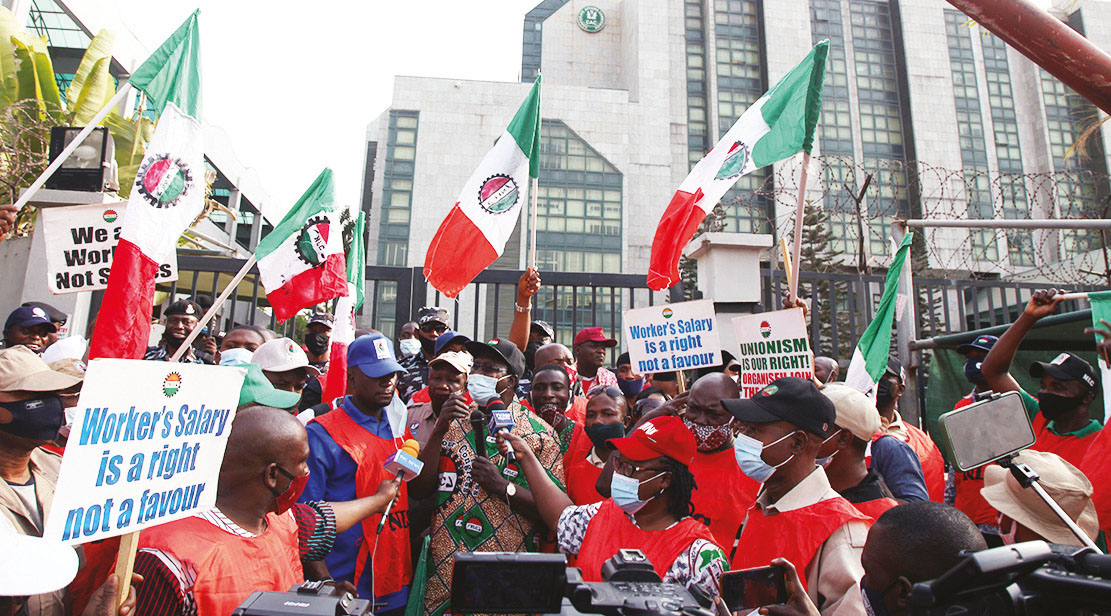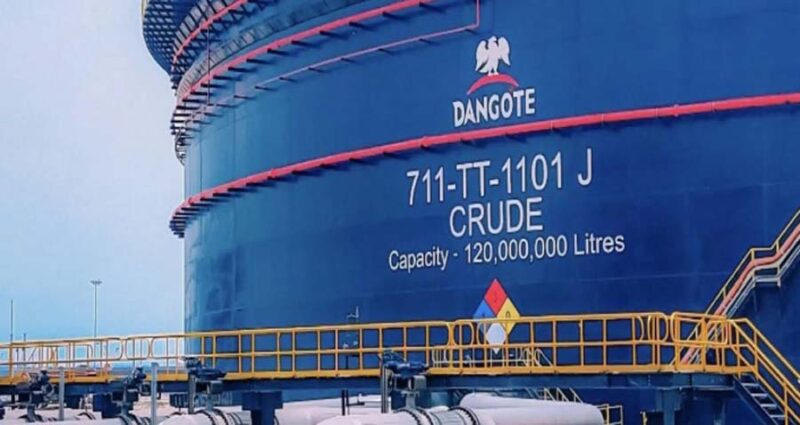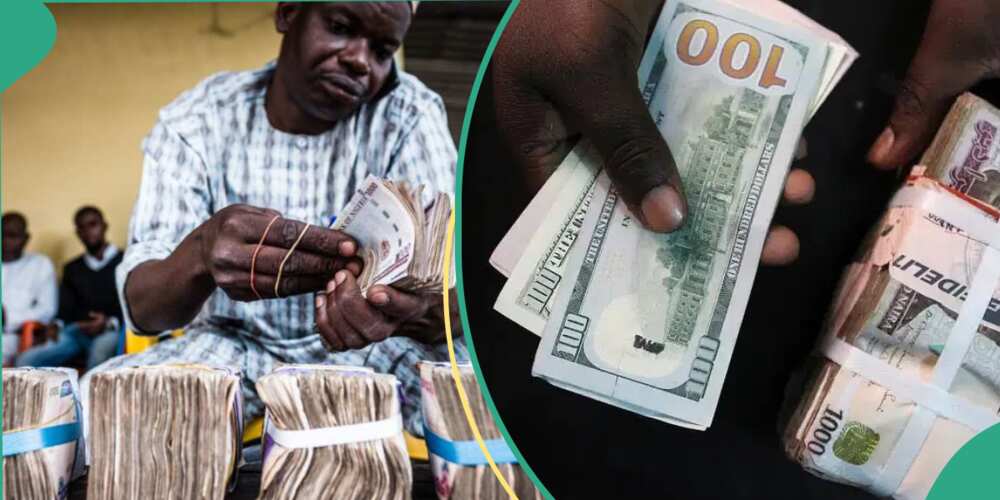Business
Minimum wage: Labour accuses nine govs of instigating constitutional crisis

Nigeria Labour Congress has accused nine governors of being behind attempts to move the national minimum wage from the exclusive to the concurrent legislative list.
The NLC has also threatened to shut down the nation over move to amend the constitution to remove minimum wage from the exclusive list to concurrent list.
But the Senate assured the labour leaders that the National Assembly would not take any action inimical to their interest.
Although the NLC leadership did not name the nine governors, records from the labour show that Taraba, Benue, Plateau, Kwara, Kogi, Cross River, Zamfara, Nasarawa and Abia are yet to commence payment of N30,000 minimum wage about two years after President Muhammadu Buhari signed the Act into law in 2019.
The NLC described the nine governors as “anti-workers,” saying one of them is using the sponsor of the bill against the interests of Nigerian workers.
President of the NLC, Ayuba Wabba, addressing workers in Abuja during the nationwide protests, said, “When the N30,000 minimum wage was fixed, it was negotiated. Six governors represented the interests of the geo-political zones. We had MAN, SMSE, LCCI, NECA also on the table.
“Our demand was N66,000 – looking at the economic challenge and how the purchasing powers of Nigerian workers have dwindled but through the process of dialogue and negotiations, including the ability to pay, on the negotiation table we were reasonable and everybody agreed on N30, 000.
“That is how the report was submitted to Mr President, a bill went to the National Assembly, there was a public hearing and it was promulgated.
“We are then taken aback by a few governors. Let me mention that the governors are nine – because some of them gave us this information; they are only nine out of the 36 that are anti-workers.
“We are told and nobody has contradicted this fact, that they (lawmakers) collect N13m per month.
“How can he (the bill sponsor) in his right senses say that the current minimum wage of N30,000 is too much for Nigerian workers? Can we say shame to him?”
Wabba also said, ”The issue of National Minimum Wage is a standard set by the International Labour Organisation (ILO), the first agency of the United Nations(UN) born in 1919 after the first world war. So we have the powers of the UN.
“What I am reiterating is that: the national minimum wage is not a Nigerian standard. It is an international standard. Their argument is that because they want federalism, they want the issue of the National Minimum Wage to be removed to the Concurrent List. That is false.
“In the countries of the world, we have 26 federal nations that have minimum wage in their Exclusive List, including the United States. As I speak to you, the minimum wage of America is $10 per hour. President Joe Biden came in and the first statement he made was that he is going to review the national minimum wage.”
The bill sponsored by Garba Mohammed from Kaduna State has passed first and second reading in the House of Representatives.
The bill seeks to decentralise the payment of minimum wage to workers in the country to allow states to pay according to their financial capacity.
Labour organised the protests at the National Assembly complex in Abuja and House of Assembly complexes in the 36 states.
Addressing the workers, the Deputy Chief Whip of the Senate, Abdullahi Sabi said told them not to worry, adding that a similar bill in the 8th Senate never saw the light of the day.
Business
Govt paying N600bn for fuel subsidy monthly — Rainoil CEO

Govt paying N600bn for fuel subsidy monthly — Rainoil CEO
The CEO of Rainoil Limited, Gabriel Ogbechie, has claimed that the federal government resumed the payment of the controversial fuel subsidy following the devaluation of the Naira in the foreign exchange market.
Ogbechie made this statement on Tuesday during the Stanbic IBTC Energy and Infrastructure Breakfast Session held in Lagos.
He pointed out that with Nigeria’s daily fuel usage at 40 million liters and the foreign exchange rate at N1,300, the government’s subsidy per liter of fuel falls between N400 and N500, culminating in a monthly total of approximately N600 billion.
He said; “When Mr. President came in May last year, one of the things he said was that Subsidy is gone. And truly, the subsidy was gone, because immediately the price of fuel moved from 200 to 500 per liter. At that point truly, subsidy was gone.
“During that period, Dollar was exchanging for N460, but a few weeks later, the government devalued the exchange rate. And Dollar moved to about N750. At that point, subsidy was beginning to come back.
READ ALSO:
- North Central Support Group rejects Northern Elders, pledges allegiance to Asiwaju
- Gunmen kidnap 2 FRSC officers along Abakaliki-Enugu highway
- Driver killed, 16 passengers abducted on Abuja-Lokoja road
“The moment the two markets officially closed, officially the market went to about N1,300. At that point, that conversation was out of the window. Subsidy was fully back on petrol. If you want to know where petrol should be, just look at where diesel is. Diesel is about N1,300 and petrol is still selling for N600.
Furthermore, he said that NNPC being the only petrol importer in the country implies that there is an ongoing subsidy, as prices had to be fixed.
Earlier yesterday, the former governor of Kaduna State, Nasir El Rufai, said the federal government is spending more on petrol subsidy than before.
In addition, the Special Adviser to the President on Energy, Mrs. Olu Veŕheijen, said that the Federal Government reserves the right to pay fuel subsidy intermittently to cushion hardship in the country.
“The subsidy was removed on May 29. However, the government has the prerogative to maintain price stability to address social unrest. They reserve the right to intervene.
“If the government feels that it cannot continue to allow prices to fluctuate due to high inflation and exchange rates, the government reserves the right to intervene intermittently and that does not negate the fact that subsidy has been removed,” she said.
Govt paying N600bn for fuel subsidy monthly — Rainoil CEO
Business
Breaking: Dangote brings diesel price down to N1000/litre

Breaking: Dangote brings diesel price down to N1000/litre
Dangote Petroleum Refinery has announced a further reduction in the price of diesel.
When it commenced operation a few weeks ago, Dangote Petroleum Refinery pegged the price of diesel as N1,200.
While rolling out the products, the refinery supplied at a substantially reduced price of N1,200 per litre three weeks ago, representing over 30 percent reduction from the previous market price of about N1,600 per litre.
READ ALSO:
- Kano anti-corruption agency slams fresh charges against Ganduje
- Troops kill ISWAP Commanders, 30 other terrorists
- Ooni of Ife dismisses agitators of Yoruba nation
However, on Tuesday, a further reduction of N200 was noticed in the price, with the product now pegged at N1,000.
This significant reduction in the price of diesel, at Dangote Petroleum Refinery, is expected to positively affect all the spheres of the economy and ultimately reduce the high inflation rate in the country.
The President of Dangote Group, Aliko Dangote, had during the Eid-el-Fitr celebration said if the cost price of diesel comes down, the inflation rate will be substantially reduced.
Dangote spoke when he visited President Bola Tinubu in his residence in Lagos State to celebrate the end of the Ramadan fast with him.
Breaking: Dangote brings diesel price down to N1000/litre
Business
Naira records five-month highest gain, sells below N1000/$ at parallel market

Naira records five-month highest gain, sells below N1000/$ at parallel market
The naira continued its positive showing against the United States dollar on Monday, selling below N1000/$ in some segments of the parallel market.
Newstrends reports that the Federal Government, groups and some individuals have mounted a spirited campaign for those hoarding the dollars to push them out as naira continues to appreciate.
On Monday, the naira was offered in some parts of Lagos and Abuja between N995 and N1,050 per dollar in the parallel market. It was N1,230/$ on Friday.
The latest gain, being over five-month highs, came in the wake of the Iranian attack on Israel and a rise in the crude oil price.
Goldman Sachs, American investment bank economists, had earlier predicted that the naira’s bullish momentum on the foreign exchange market would likely cause it to trade for less than N1,000 per US dollar in the coming months.
According to a report by Nairametrics, the group claimed that the rally in Nigerian currency helped recover from large losses after two devaluations since last June by being bolstered by capital inflows and successive interest rate hikes.
In March, Goldman Sachs projected that the Naira would appreciate to N1,200 per dollar in 2024.
At the official foreign exchange market, the rate was put at N1,136/$ in contrast with N1,205/$ last Friday.
The top bank has implemented several policy initiatives in recent months to bring stability to the foreign exchange market.
The CBN increased interest rates to 24.75% at the most recent meeting of the Monetary Policy Committee (MPC), which helped it recover losses from the two devaluations that occurred since June of last year.
Further gains for the naira result from the CBN’s ongoing intervention, which involves selling foreign exchange to Bureau De Change operators at a revised rate.
The market anticipates higher inflows of US dollars from the sale of foreign currency bonds in the second quarter as disclosed by Finance Minister Wale Edun.
The Federal Government has just offered high-yield short-term debt products at a premium to entice overseas capital into the economy.
The Middle East’s geopolitical unrest and
Notwithstanding a drop in Nigeria’s production volume, crude oil prices have risen beyond $90.
Nigerian grades of oil are trading at a premium to the ICE Brent benchmark.
The Middle East’s geopolitical unrest and the anticipation of an Iranian government strike on Israel caused oil prices to soar.
-

 metro7 days ago
metro7 days agoTroops arrest ISWAP commander involved in Army General, 3 soldiers’ killing in Borno
-

 News7 days ago
News7 days agoBREAKING: Ex-Abia gov, Ogbonnaya Onu, is dead
-

 Sports6 days ago
Sports6 days agoKane’s three children involved in car crash, hospitalised
-

 metro5 days ago
metro5 days agoTroops neutralise 188 terrorists, rescue 133 hostages in assault operations
-

 News5 days ago
News5 days agoFG gives update on where fleeing Binance executive is hiding
-

 News7 days ago
News7 days agoEdo APC chairman visits Shaibu after impeachment
-

 Entertainment5 days ago
Entertainment5 days agoTolani Baj expresses love for Bobrisky
-

 Business5 days ago
Business5 days agoNaira continues gain, sold N1,150/$ at parallel market






















